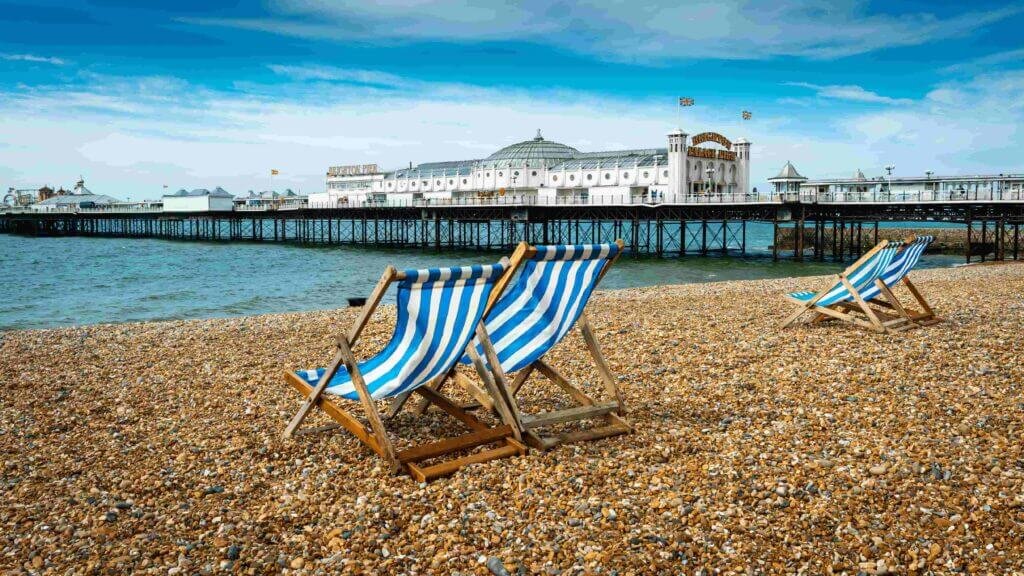The best language trips: Study English in the UK While Exploring a unique country
Discover a unique experience where you can explore the world and improve your English at the same time!
Language trips are the ideal solution for anyone who wants to improve their English while discovering new cultures and experiencing exciting adventures.
Whether you’re a student, a professional, or simply a travel enthusiast, a language trip allows you to study English in the UK while enjoying a stay abroad.. Imagine discovering the wonders of London while practising your English with native speakers. Or discover England’s magnificent seaside resorts, from Brighton with its Victorian pier to the spectacular cliffs of the Jurassic Coast, (Dorset and East Devon), while perfecting your pronunciation.

Language trips offer real language immersion, where you’ll be immersed in an authentic English-speaking environment. You’ll be able to practise the language every day, whether in class, at cultural activities or even chatting to your new international friends.
Don’t miss this unique opportunity to explore the world while enhancing your English skills. Let yourself be carried away by this enriching experience rich in discovery and language learning.
English: An Essential Skill in Today’s World
Today, mastery of English is a growing necessity in many areas of society. Whether you’re a student, a professional or simply a traveller, having solid English language skills has become an essential asset.
In the tourism industry, for example, the ability to communicate in English makes it easier to welcome and inform foreign visitors, whether they come from the United States, the United Kingdom or other countries. Whether in the most popular tourist regions, or in rural areas, international tourism continues to grow. And to welcome these English-speaking travellers, a fluent command of English is essential.
In the business world too, English has become the lingua franca in many sectors, from finance to international trade. For any ambitious executive, the ability to express themselves fluently in English is now an essential prerequisite, even if it is not used on a daily basis. Companies are looking for employees who are capable of conducting negotiations, making presentations and maintaining professional relations with international partners.
On a language study holiday, participants attend English classes taught by qualified teachers, usually native speakers. These courses are often designed to be interactive, using modern teaching methods that encourage engagement and participation. Courses are usually taught in small groups of up to fifteen people, and often in even smaller groups, depending on the school and the time of year. Private tuition is also available. In addition to classes, students have the opportunity to take part in a variety of cultural activities, excursions and social events that reinforce their language learning outside the classroom.
Why Choose a Language Study Holiday?
Although new technologies have greatly improved and facilitated language learning, nothing can replace the incredible experience of a language study holiday in total immersion. It allows you to immerse yourself fully in the language and culture, while benefiting from the expertise of highly qualified teachers and stimulating exchanges with learners from all over the world.
Language travel offers a multitude of benefits that go far beyond learning English. Firstly, total immersion in an English-speaking environment allows students to practise the language on a daily basis. This regular exposure to English, whether through conversations with native speakers, intensive courses or social activities, helps to improve listening comprehension and fluency.
What’s more, language trips are a unique opportunity to discover new cultures. By living in a foreign country, participants can explore different traditions, cuisines and ways of life. This cultural immersion not only enriches the learning experience, but also develops the open-mindedness and intercultural understanding that are essential in today’s multicultural world.
Finally, language travel helps to build self-confidence. Being in a new country, navigating unfamiliar situations and communicating in a foreign language can be challenging, but it also helps to overcome apprehensions. Participants often come away from the experience with a sense of achievement and an increased desire to continue learning and exploring.
Rapid and lasting progress
Compared with weekly courses over the course of a year, an intensive language study holiday lasting just a few weeks will enable you to make astonishing and, above all, lasting progress. Why? Because you’ll be combining learning with a motivating life experience, full of captivating discoveries and inspiring encounters. Your investment will therefore be multiplied by three: education, personal development and cultural openness.
Popular Language Travel Destinations in the UK
The UK offers a number of popular destinations for language travel, each offering a unique experience for learning English through immersion. London stands out as one of the most popular cities, offering an unrivalled wealth of culture with its museums, theatres and iconic historic sites. Travellers can immerse themselves in the English-speaking environment while enjoying the bustle of the British capital.
Cambridge and Oxford, renowned for their prestigious universities, attract students keen to immerse themselves in an academic environment. These cities are ideal for quality learning in a historic setting.
Brighton, with its relaxed seaside atmosphere, is perfect for those who want to combine learning with relaxation. This seaside town offers a pleasant setting and a cosmopolitan spirit, ideal for a language study holiday.

Cities such as Manchester and Edinburgh also provide an enriching language immersion experience, with their vibrant cultural life and rich heritage. Norwich, meanwhile, offers a more peaceful and charming atmosphere, with its medieval streets and historic buildings, ideal for a more authentic and local experience. Kent and the Winchester area offer options for quiet breaks, with beautiful scenery and a rich heritage.
Each of these destinations in England and Scotland offers quality courses and unique opportunities to discover British culture while mastering the language.

Types of language travel programmes
Language travel programmes vary according to the needs and objectives of the participants. Among the options available are intensive courses, which focus on learning English quickly. These programmes are often designed for students who want to improve their language skills in a short space of time. Courses may include classroom lessons, practical workshops and conversation exercises.
Students who already have an intermediate level of English but want to take their mastery to the next level can take specialised courses to prepare for language certifications such as the Cambridge exams, TOEIC or IELTS. These certifications are often recommended by certain leading business or engineering schools, and may be required for university exchanges. Other students choose to take them as formal proof of their level on their CV.
Finally, there are programmes that combine learning English with other activities, such as sport or art. For example, some centres offer English lessons followed by yoga classes, or sporting activities such as tennis, golf, horse-riding or water sports. This allows participants to engage in passions while improving their command of the English language in a friendly and stimulating context.
There are also family travel options. In the first case, the main learners are the parents. It is then possible to organise a family holiday, with activities adapted for children according to their age, such as leisure activities with other English-speaking children, without necessarily including formal language lessons.
In the second case, the children, teenagers or young adults are the main learners. Parents can accompany them, staying together as a family and taking advantage of the stay to discover the local culture or relax while the children follow their English lessons.
How to choose the best programme
Choosing the right language travel programme can seem like a daunting task, but with a few practical tips, it becomes much easier. The first step is to define your learning objectives. Do you want to improve your general English or focus on specific skills? Having a clear idea of what you want to achieve will help you narrow down your options.
It’s also essential to consider the destination. Some people may prefer the bustle of a big city like London, Manchester or Edinburgh, while others may be looking for the charm of a small town in England. The culture, climate and activities available in the area are all factors to consider when choosing a destination.

The costs associated with language travel
The costs of language travel can vary considerably depending on a number of factors, including the destination, the length of stay and the type of programme chosen. In general, it is important to take into account not only the course fees, but also the costs of accommodation, food and transport.
For students, there are sometimes grants or financial aid available. Check with your school or with specialist organisations that may offer financial support for language trips.
And don’t forget to budget for extra-curricular activities. Taking part in excursions, visits to museums or cultural events can enrich your experience, but they also have a cost. By setting a realistic budget and planning ahead, you can make the most of your language trip without worrying about unexpected expenses.
It is advisable to check whether you already have insurance included with other financial services or insurance products, such as those linked to your bank card, for example. If not, you should consider taking out travel insurance covering at least the duration of your stay. This should include medical care, repatriation, cancellation and loss of luggage. Although not compulsory, this cover can protect you in the event of unforeseen circumstances.
Common mistakes to avoid on a language trip
Although language travel is an enriching experience, it’s easy to fall into a few common pitfalls. One of the most common mistakes is not fully engaging in the learning process. Some participants, despite being in immersion, may tend to spend time with other French speakers, which limits the opportunities to practise English. It is essential to get out of your comfort zone and integrate into international student groups to maximise learning.
Another mistake is not taking advantage of the resources available. Language schools often offer a variety of activities, workshops and social events, as well as libraries stocked with learning materials. Ignoring these opportunities can reduce the impact of the experience. By taking part in activities and exploring educational resources, not only will you improve your language skills, but you will also enrich your stay with valuable social interaction and cultural discoveries.
Finally, it’s important not to have unrealistic expectations. Learning a language takes time, and everyone progresses at their own pace. Having clear objectives is essential, but you also need to remain flexible and open to challenges. By keeping a positive attitude and staying motivated, you’ll be able to get the most out of your language trip.
Inspiring stories : They transformed their lives thanks to language travel
Participant testimonials confirm the lasting impact of such an adventure:
“I’d always dreamed of learning English, but my stay in London was the real turning point. As well as improving my English, I broadened my network and met some unforgettable people.” – Antoine, student in France.

Another testimonial comes from Alice, a young professional, who shares her experience:
“I had an incredible time in London, where I was able not only to improve my English, but also to fully immerse myself in British culture. The intensive programme was enriching, and the events organised, both at school and outside, gave me the opportunity to meet some wonderful people from all walks of life. The teachers are the best I’ve ever had, and the lessons alternate perfectly between serious and fun times, which makes learning a pleasure. Thanks to this experience, not only have I progressed in my career, but I’ve also expanded my international network.’“
These stories testify to the positive impact that a language trip can have. Whether for academic, professional or personal reasons, every participant leaves with unique memories and improved language skills. These experiences reinforce the idea that travelling and learning a language go hand in hand, and that every adventure is an opportunity to grow.
Conclusion: Language Travel as a Gateway to Learning and Discovering New Cultures
In short, language travel is an exceptional opportunity to learn English and discover the world at the same time. Immersion in an English-speaking environment, combined with the discovery of new cultures, creates an unparalleled learning experience. Whether you’re a student, professional or simply passionate about travel, there’s a language programme to suit your needs.
The importance of learning a language in an international context cannot be underestimated. Language skills open doors and create opportunities on both a personal and professional level. Language trips not only allow you to acquire these skills, but also to develop intercultural relationships and unforgettable memories.
If you’re thinking of going abroad to improve your English, don’t hesitate to take the plunge. With the right preparation and an open-minded attitude, every language study holiday can turn into an enriching adventure, both linguistically and culturally. Get ready to explore the world while you learn, and enjoy an experience that will leave an indelible mark on your life.
Contact us for any information about our language travel offers


